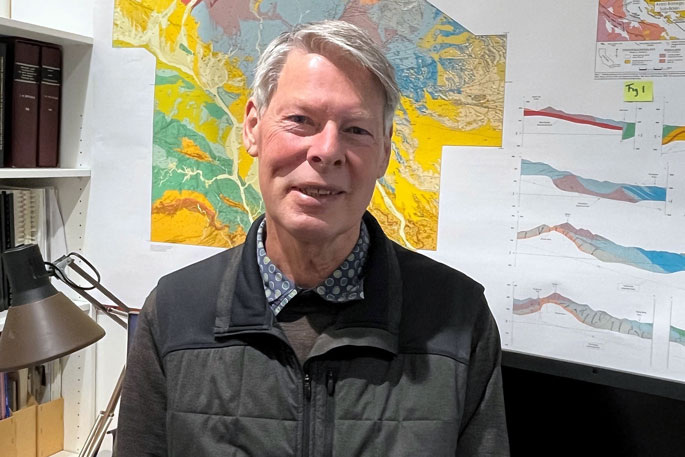Advances in technology will help New Zealand become more resilient in dealing with natural hazards such as major earthquakes and landslides, says a retiring Canterbury academic.
Emeritus Professor Jarg Pettinga, who has spent four decades researching seismic and landslide hazards, is stepping down after 43 years in the Department of Geological Sciences at Te Whare Wānanga o Waitaha | University of Canterbury (UC), including 15 years as a professor.
He says the range of new ground surface technologies now available to researchers has been the most dramatic change during his career, which has seen him make significant contributions to the fields of plate tectonics, earthquake geology and landscape evolution.
“The most exciting developments have been around the technologies now available to capture landforms in high detail and with tremendous accuracy, such as the imagery provided by airborne LiDAR survey data and satellites. There’s so much more information available that we’re able to make use of to develop models and provide in-depth understanding of geological evolution and landform changes. These are immensely powerful tools.
“Similarly, in the marine environment, we’re now able to survey and obtain high resolution maps of the seafloor and the geology beneath, so we’re much more advanced in terms of the detail that we can observe and interpret. That has provided crucial new research documenting offshore earthquake activity and the active seabed process around New Zealand. These data are a vital addition to underpinning our national seismic hazard modelling and determining the tsunami hazard.”
During his distinguished career, Emeritus Professor Pettinga has provided expert advice to regional and national groups.
He shared his seismic knowledge following the devastating Canterbury earthquake sequence, and again in 2016 following the Kaikoura quake, and gave evidence at the Canterbury Earthquakes Royal Commission of inquiry.
“One of my main career highlights has been my contribution to a better understanding of seismic hazards in the Canterbury region,” he says.
“It’s research that I worked on in collaboration with PhD and master’s research students, and academic and technical staff at UC and other external organisations, especially NIWA and GNS Science.”
He also feels positive about his early career research documenting the development of the Hikurangi Subduction Margin located along the eastern North Island of New Zealand, a tectonic plate-boundary structure.
“It was one of the first formally published detailed examples of how a plate boundary subduction zone evolves. It’s still very topical now because it’s a region most likely to generate a very large earthquake or mega-quake,” he says.
Emeritus Professor Pettinga chaired the Gateway Antarctica Advisory Board for seven years, and also chaired the Royal Society Te Apārangi Marsden Fund Earth Science and Astronomy Panel for six years.
He has been recognised with awards and honours throughout his career, including the prestigious Hamilton Award of the Royal Society of NZ in 1984, a UC Teaching Award in 2005 and the Antarctic Service Medal from the National Science Foundation in the United States in 2005.
He spent a year at the University of California, Santa Barbara in 1986 as a Fullbright Visiting Research Scholar undertaking a research mapping project in the Southern California desert region.
During his time at UC, he has held various senior roles alongside his research and teaching duties, including Acting Deputy Vice-Chancellor in 2012 and 2016, Acting Pro-Vice-Chancellor for the College of Science in 2009 and College of Arts 2009-2010, Acting Director of UC’s Research and Innovation Office in 2020, and Director of the Natural Hazards Research Centre. He also served as Head of the Department of Geological Sciences from 2007-2016.
Emeritus Professor is an honorary title awarded by the UC Council to retiring, long-serving professors who have made an outstanding contribution in their field.



0 comments
Leave a Comment
You must be logged in to make a comment.